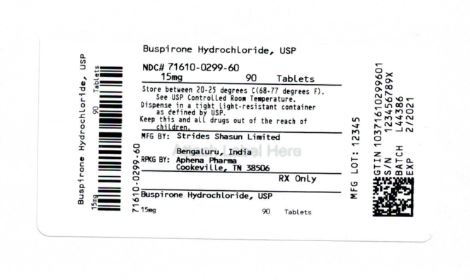There are high number of clear evidence that breastfeeding provides best nutrition that you can give to your baby. It is also evident that lactation is good for mothers health as well. Evolution has designed breastfeeding in a way that it caters all nutritional need of your child. However modern medicine is quite new for evolution, that is why mothers body is not well prepared to filter unnecessary chemical found in medicines. It becomes a necessity to figure out which drug is safe and which drug is dangerous for your newborn while nursing. In this article we will understand function of Buspirone Hydrochloride Tablet 15 Mg and its suitability with breastfeeding.
What is Buspirone Hydrochloride Tablet 15 Mg used for?
Buspirone Hydrochloride Tablets, USP are indicated for the management of anxiety disorders or the short-term relief of the symptoms of anxiety. Anxiety or tension associated with the stress of everyday life usually does not require treatment with an anxiolytic. The efficacy of buspirone has been demonstrated in controlled clinical trials of outpatients whose diagnosis roughly corresponds to Generalized Anxiety Disorder (GAD). Many of the patients enrolled in these studies also had coexisting depressive symptoms and buspirone relieved anxiety in the presence of these coexisting depressive symptoms. The patients evaluated in these studies had experienced symptoms for periods of 1 month to over 1 year prior to the study, with an average symptom duration of 6 months. Generalized Anxiety Disorder (300.02) is described in the American Psychiatric Association's Diagnostic and Statistical Manual, III 1 as follows: Generalized, persistent anxiety (of at least 1 month continual duration), manifested by symptoms from three of the four following categories: Motor tension: shakiness, jitteriness, jumpiness, trembling, tension, muscle aches, fatigability, inability to relax, eyelid twitch, furrowed brow, strained face, fidgeting, restlessness, easy startle. Autonomic hyperactivity: sweating, heart pounding or racing, cold, clammy hands, dry mouth, dizziness, lightheadedness, paresthesias (tingling in hands or feet), upset stomach, hot or cold spells, frequent urination, diarrhea, discomfort in the pit of the stomach, lump in the throat, flushing, pallor, high resting pulse and respiration rate. Apprehensive expectation: anxiety, worry, fear, rumination, and anticipation of misfortune to self or others. Vigilance and scanning: hyperattentiveness resulting in distractibility, difficulty in concentrating, insomnia, feeling "on edge", irritability, impatience. The above symptoms would not be due to another mental disorder, such as a depressive disorder or schizophrenia. However, mild depressive symptoms are common in GAD. The effectiveness of buspirone in long-term use, that is, for more than 3 to 4 weeks, has not been demonstrated in controlled trials. There is no body of evidence available that systematically addresses the appropriate duration of treatment for GAD. However, in a study of long-term use, 264 patients were treated with buspirone for 1 year without ill effect. Therefore, the physician who elects to use buspirone for extended periods should periodically reassess the usefulness of the drug for the individual patient.
Buspirone Hydrochloride Tablet 15 Mg while breastfeeding safe or not? Can there be any side effects for infant while using it during breastfeeding?
Buspirone hydrochloride is the one and only active ingredient present in Buspirone Hydrochloride Tablet 15 Mg. Buspirone hydrochloride in itself is a low risk drug for lactation so it is easy to understand that Buspirone Hydrochloride Tablet 15 Mg also comes in category of Low Risk item while breastfeeding. Below is the summary of Buspirone hydrochloride in breastfeeding.
Statement of Manufacturer/Labeler about breastfeeding usage
Nursing Mothers The extent of the excretion in human milk of buspirone or its metabolites is not known. In rats, however, buspirone and its metabolites are excreted in milk. Buspirone administration to nursing women should be avoided if clinically possible.
Buspirone Hydrochloride Tablet 15 Mg Breastfeeding Analsys
Low RiskAvoid a chronic use
Buspirone Hydrochloride Tablet 15 Mg Breastfeeding Analsys - 2
CAS Number: 36505-84-7
Limited information indicates that maternal doses of buspirone up to 45 mg daily produce low levels in milk. Because no information is available on the long-term use of buspirone during breastfeeding, an alternate drug may be preferred, especially while nursing a newborn or preterm infant.
What should I do if I am breastfeeding mother and I am already exposed to Buspirone Hydrochloride Tablet 15 Mg?
During whole lactation period you shall first discuss with your doctor and then together you shall decide whether you shall take that drug or not however if you have already taken Buspirone Hydrochloride Tablet 15 Mg then you shall inform your doctor, But you should not be worried too much as Buspirone Hydrochloride Tablet 15 Mg comes in category of low risk drug.
I am nursing mother and my doctor has suggested me to use Buspirone Hydrochloride Tablet 15 Mg, is it safe?
Buspirone Hydrochloride Tablet 15 Mg comes in category of low risk and if your doctor is aware that you are breastfeeding it should be ok to use without much concerns.
If I am using Buspirone Hydrochloride Tablet 15 Mg, will my baby need extra monitoring?
Not much
Who can I talk to if I have questions about usage of Buspirone Hydrochloride Tablet 15 Mg in breastfeeding?
US
National Womens Health and Breastfeeding Helpline: 800-994-9662 (TDD 888-220-5446) 9 a.m. and 6 p.m. ET, Monday through Friday
UK
National Breastfeeding Helpline: 0300-100-0212 9.30am to 9.30pm, daily
Association of Breastfeeding Mothers: 0300-330-5453
La Leche League: 0345-120-2918
The Breastfeeding Network supporter line in Bengali and Sylheti: 0300-456-2421
National Childbirth Trust (NCT): 0300-330-0700
Australia
National Breastfeeding Helpline: 1800-686-268 24 hours a day, 7 days a week
Canada
Telehealth Ontario for breastfeeding: 1-866-797-0000 24 hours a day, 7 days a week


